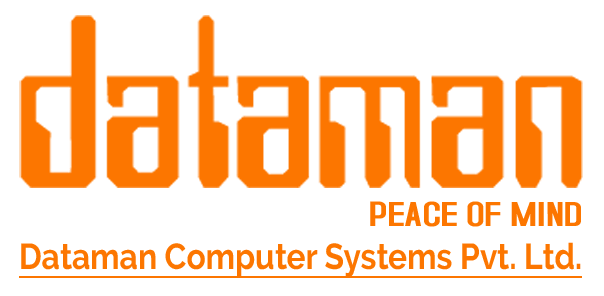- +91 9511117684
- shweta@dataman.in
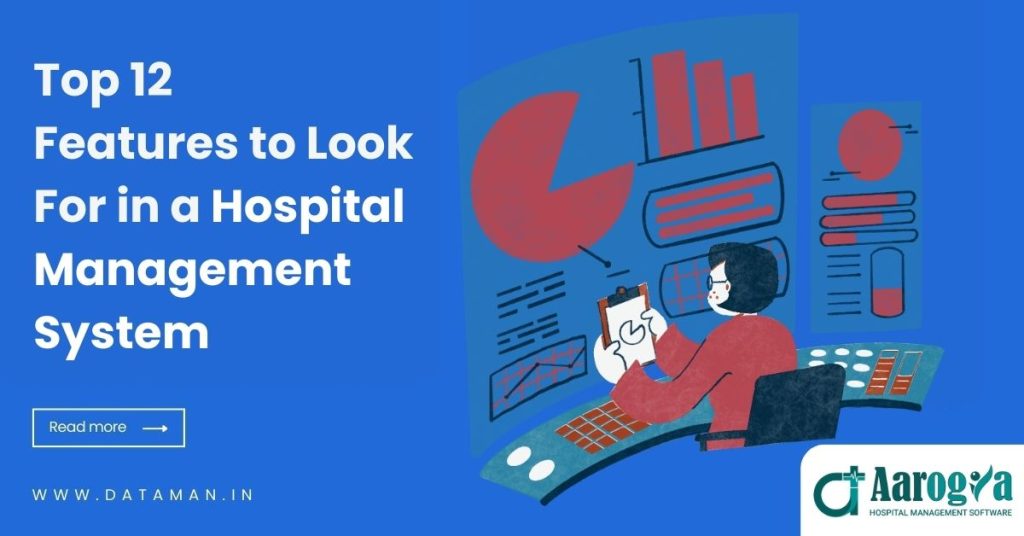
Table of Contents
Post Views: 16,248
If you fall into any one of these categories:
- Currently managing a hospital and want to digitise your workflow.
- Have recently started up a new venture in the healthcare industry.
- Are not satisfied with existing hospital solutions and are looking for better alternatives.
This article is probably suited for you. It discusses modern practices to help you manage your everyday operations digitally and distribute the workload of your resources efficiently through a hospital management system(HMS).
In this blog post, we will discuss 12 essential features in a hospital management system that can bring more productivity to your hospital. (On a side note, a HMS can reduce your operational costs by up to 50%.) But, before we dive deeper into the features of the Hospital Management System, let’s discuss what a HMS is.
Also Read: What is HMIS? Difference between HMIS and HIMS? Benefits of HMIS
What is a Hospital Management System (HMS)?
Hospital management system (HMS) is an integrated software solution that helps hospitals to manage their day-to-day operations. It typically includes modules for patient records, appointments, billing, inventory, payroll, pharmacy, laboratory etc. thus giving you an overall packaged solution to manage your healthcare business.
HMS can help hospitals:
- Improve efficiency by automating tasks and reducing manual processes.
- Reduce costs by optimising resource utilisation and eliminating waste.
- Improve patient care by providing practitioners with access to real-time patient information and enabling better coordination of care.
Features to Look for in a Hospital Management System (HMS)
1. Patient Appointment and Registration:
In the landscape of modern healthcare, the procedure of booking an appointment as a patient or registering a patient into the hospital is a cakewalk.
Patient Appointment:
Based on availability of your doctors it allows you to schedule your patient’s appointments. Furthermore, if there are changes in your plan, you can cancel or reschedule appointments after which a notification will be sent to the respective authorities (here doctors and patients). Thus, making the entire process real time and automated. These smart systems also send reminders through emails or SMS/WhatsApp so your patient never misses an appointment. This increases the turn around rate of your patients and saves a lot of time for your doctors.
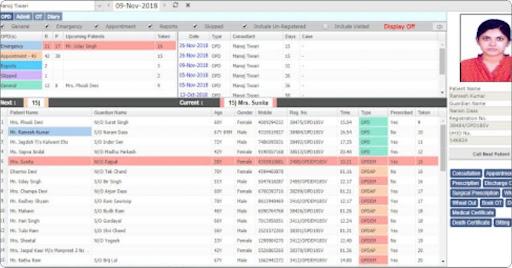
Screenshot of Online Appointment Booking system
Online Appointment Booking System in Aarogya Hospital Management Software
At first glance it seems how significant the outcomes can be with online patient registration. Well, this stat from the 2019 Accenture survey might change your perspective. About 70 percent of patients choose providers who send emails or text messages when it’s time for preventive or follow-up care.
As per another Appointment Scheduling Statistics (published by Financeonline.com), 42% of patients and 60% of healthcare professionals prefer online appointment booking as it encourages them to follow up informatively.
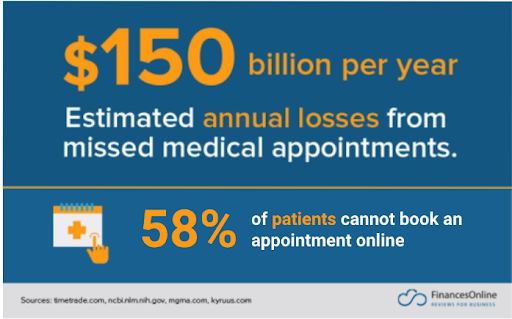
Report of Online Consultation Stats
Patient Registration :
Whenever a new patient signs up, their information gets saved, with a unique registration ID (UID). All future EHR (Electronic Health Records) will be linked to this UID.
Particularly for the healthcare industry of India:
Some software solutions like Aarogya HMS can take you a step further by providing direct and seamless integration to ABHA (Ayushman Bharat Health Record) platform. This integration enables the secure and convenient transfer of patient medical records between the hospital’s database and the ABHA portal, making them accessible from anywhere and anytime.
2. OPD/Day Care Management
OPD or Out Patient Department is one of the busiest places of a hospital and its management is essential to save cost and increase productivity of your medical staff. It is recommended that consultants have a dedicated dashboard to schedule appointments or handle walk-ins. Since the number of patients visiting is typically high, these dashboards ensure prevention of any human error and give them authority to control the workflow.
Modern day softwares even provides specialised prescriptions based on patient needs. A doctor can create templates for particular common epidemic diseases like dengue, malaria, covid-19, etc and can save time without needing to type the prescription.
These templates reduce the appointment consultation time by 10%.
A study published in the National Library of Medicine shows Of 55,992 new prescriptions, 532 (0.95%) contained inconsistent communication, leading to hazardous medical emergencies, thus saving hospital its precious time.
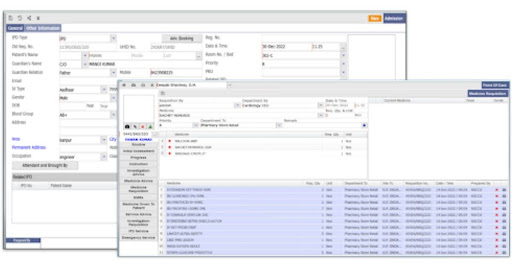
Ttypical prescription creation in Aarogya HMS
A good HMS also manages procedures like dialysis, chemotherapy, and physiotherapy, ensuring timely care. It seamlessly links with outpatient billing, streamlining the process. It interfaces with the queue management system, reducing wait times and enhancing the overall patient experience.
3. IPD Management
This system efficiently handles admissions, transfers and discharge of patients within the hospital. It’s not just about paperwork; it simplifies patient care from the get-go.
When patients are admitted, their initial assessments and medical observations get recorded, making sure every detail is on record for the best care possible. Plus, the system allows for package allocation, simplifying the management of different care plans and services. At discharge a patient gets a comprehensive discharge summary, ensuring a clear transition before leaving the hospital.
Critical reports like bed occupancy analysis, makes it an invaluable tool for hospital management, providing insights into bed utilisation and giving accurate forecasting for you to grow your business.
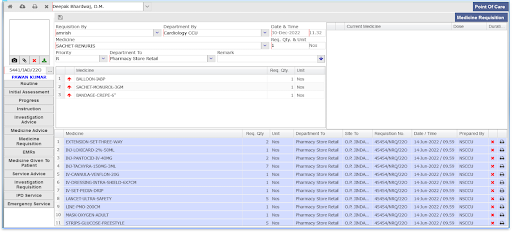
Nursing-station-IPD-Aarogya
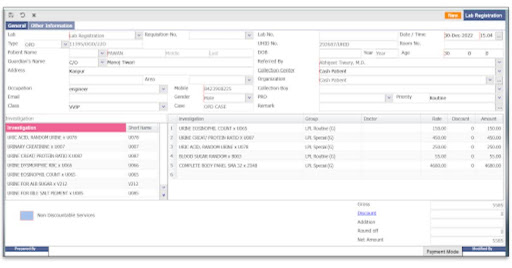
IPD Registration in Aarogya HMS
4. TPA/Corporate Management
As per a survey from Onsurity (a subscription-based employee healthcare benefits provider) 83% of patients did not know whether their healthcare plan covered preventive health check-ups and the same percentage of people were unaware of the benefits their employer-provided healthcare plan offered.
Since HMS can also track insurance limits and approvals, you can ensure that patients get the care they need, and avail all the benefits listed by the insurance provider.
Any kind of bill to these organisations, third-party administrators (TPAs), and insurance companies can be created at one place. Furthermore, to give hospitals an accurate picture of the financial position it can handle claims settlements and outstanding balances.
Also Read: Significance of Hospital Management Advanced Software for Hospitals/Clinics
5. Operation Theatre (OT) Management
HMS solution efficiently schedules surgeries based on both availability and priority, ensuring that critical surgeries are prioritised while considering all aspects.
Before surgeries, the system handles preoperative assessments like maintaining anaesthesia records, any analgesic administration, medications administered, etc thus giving a comprehensive patient history for a smooth and safe surgical experience. Additionally, the inclusion of digitised multilingual consent forms ensures clear communication between medical staff and patients, regardless of language barriers.
During surgeries, the system records detailed surgical notes about the proceedings of the operation. This ensures a well-documented and organised surgical process, contributing to safer and more efficient patient care
Sterilisation Management and Inventory: Comprehensive HMS like Aarogya, provides linking of sterilisation with inventory. This gives a real time update about current medical facilities in the hospital and helps in preventing any shortages of equipment by raising timely alerts.
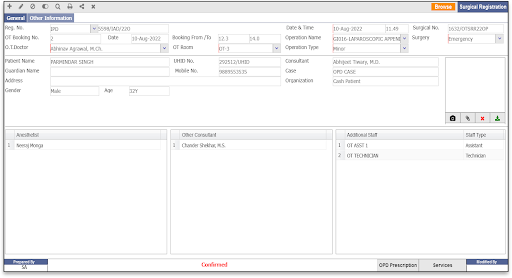
OT Surgical Registration
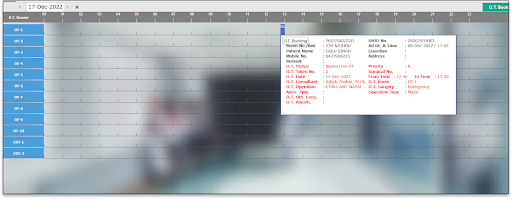
OT Booking
6. Laboratory & Radiology Management
Streamlines patients coming from in-house consultation or referential consultation.
It manages sample collection and generates barcodes, ensuring accuracy and efficiency in sample tracking. This simplifies the process for patients and staff, minimising errors and enhancing overall patient care.
Once samples are collected, the system efficiently prepares test reports, making the information readily available for medical staff and patients. It doesn’t stop there; it meticulously tracks the consumption of reagents and films, ensuring a smooth supply chain within the laboratory.
Moreover, the system seamlessly integrates with laboratory machines, fostering a harmonious connection between technology and healthcare. For eg. Aarogya can currently be integrated with 100+ machines from more than 40 different manufacturers.
The lab integration removes any manual errors from the tedious process of Data entry while helping you process samples for more clients. On average these integrations help you scale your clientele by 3 times.
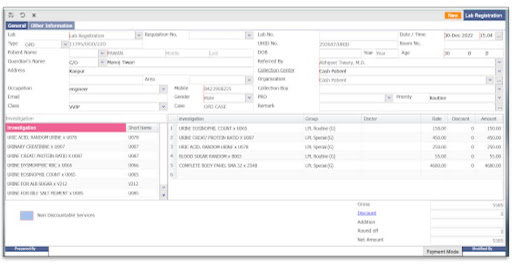
Lab Registration Entry Using Aarogya
7. Purchase & Inventory Management
Your hospital can have multiple stores. Linking them to nursing stations, theatres, and other departments to streamline the flow of supplies across the hospital is a big task in itself. The HMIS tools can do this for you.
In real-time, the system enables requests for stocks from various sub-stores and oversees their disposal, ensuring that necessary supplies are readily available and eliminating unnecessary stockpiling.
Moreover, it streamlines the ordering and billing processes, optimising the administrative aspects of managing inventory. The system handles approval management, ensuring that the right protocols are followed for stock requests, orders, and disposals, maintaining a transparent, structured and controlled inventory system within the hospital.
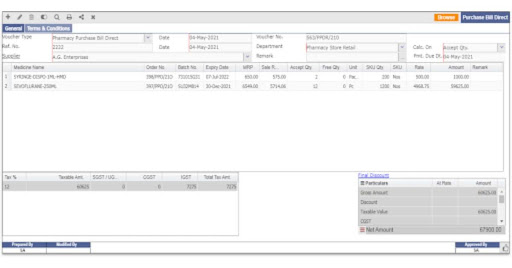
Purchase Bill Entry in Aarogya Hospital Management Software
8. Electronic Medical Records (EMR) Management
Hospital management system software maintains record of patient files and their storage locations, ensuring easy access to crucial medical information when needed.
Moreover, it oversees the movement of patient files across various hospital departments. It takes care of the sharing of information among different sections, ensuring that all involved in a patient’s care have access to the necessary records. This enhances communication and coordination, ultimately leading to more comprehensive and effective patient care.
Compliance:
NABH offers accreditation to healthcare organisations on a voluntary basis. The accreditation process involves a comprehensive assessment of the organisation’s infrastructure, processes, and outcomes.
There are a number of NABH compliance requirements that healthcare organisations must meet in order to be accredited. These requirements are based on international best practices and are designed to ensure that healthcare organisations provide safe and high-quality care. Your HMS easily takes care of your NABH credentials and gives you a single point access to all records.
Also Read: How Hospital Management Information System Can Improve Your Administration
9. Payroll Management
One pivotal benefit of a Hospital Management System is its payroll management. This system efficiently handles the complex task of managing payroll for the diverse staff within the hospital.
Linking it with your attendance tracking system can make your life simpler. It ensures accurate and timely payment to employees, encompassing various aspects such as salary calculations, deductions, allowances, and bonuses. The system maintains detailed records of employee information, making the payroll process smooth and error-free.
Moreover, it aids in compliance with labour regulations and tax requirements, ensuring that the hospital meets all legal standards and maintains a fair and transparent payroll system for its employees.
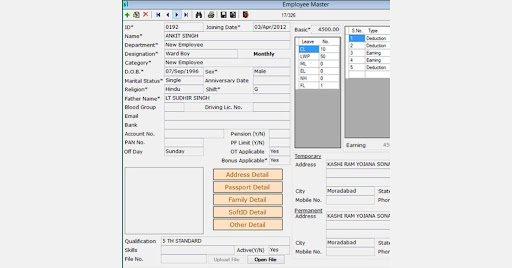
Employee Master in Payroll Management
10. Pharmacy Management
A significant advantage of a Hospital Management System is its comprehensive management of medication across the healthcare facility. This system efficiently accepts requisitions of medicines from different departments, ensuring a smooth flow of pharmaceutical supplies.
It meticulously manages medicine stocks based on various parameters like company, batch, category, specific drug, and generic types, ensuring an organised and efficient inventory system.
Once requisitions are received, the system handles the distribution of medicines from the nearest possible store to patients and wards, streamlining the process and ensuring that patients receive the necessary medications in a timely manner.
With timely alerts for expiring medicines, expired medications can be promptly identified and removed from the inventory, maintaining the safety and efficacy of the supplies.
To get analysis of sales and insights into medication sales and trends you can use detailed ABC/FSN/XYZ analysis reports.
Additionally, the system ensures GST compliance, adhering to taxation regulations, and ensuring that the hospital’s medication operations meet the required financial and legal standards.
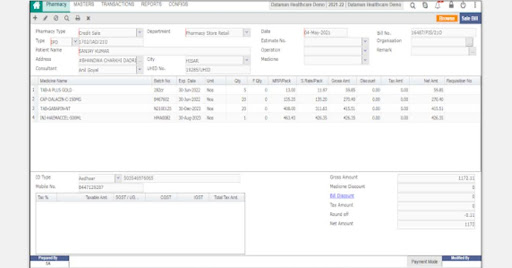
Sales Bill Report in Pharmacy Module of Aarogya HMS
11. Financial Accounts
HMS integrates with billing departments to provide a seamless flow of financial data, including information on the general ledger, accounts payable, and accounts receivable. This integration enables hospitals to generate key reports that offer statistical details essential for informed decision-making. These reports provide insights into the hospital’s financial landscape, aiding in strategic planning and resource allocation.
Furthermore, HMS efficiently generates the final book of accounts, offering a comprehensive financial overview. This capability ensures accuracy and transparency in financial records, contributing to the smooth functioning and financial health of the hospital.
12. Emergency/Ambulance Management
Efficient emergency response is crucial for hospitals. Hospital management systems (HMS) can save labour intensive jobs in emergency/ambulance management by scheduling ambulances, tracking daily usage, scheduling maintenance, managing patient information, allocating care packages, handling billing and discharge, generating discharge summaries, and analysing bed occupancy.
You get an accurate estimate of the number of vehicles you have, their current position and based on their availability an immediate response can be given to any emergency. Since the billing is taken care of by the software itself, you can use the precious time of your resources effectively.
In this blog, We’ve explored the features of hospital management software. To discover the key functions of an effective hospital management system.
Wrapping Up
The Hospital Management System is the heartbeat of modern healthcare, weaving together every aspect of a patient’s journey. From scheduling appointments to handling emergencies and managing records, it’s the system powering efficient patient care.
The system ensures that patients get the right care at the right time. It helps hospitals run smoothly, managing everything from medicines to finances while keeping a close eye on patient well-being.
0
